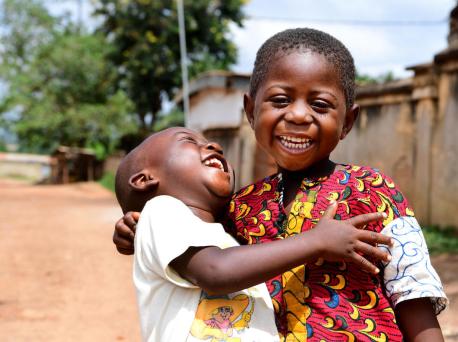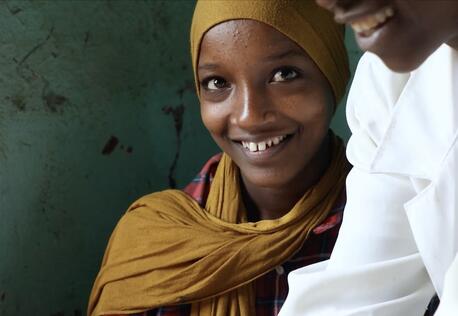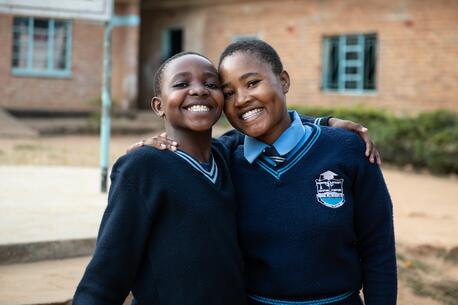
Thank You for Stepping Up to Help the World's Children
Families all over the world continue to suffer the effects of the COVID-19 pandemic. Lives have been upended, social systems strained. For the most vulnerable children, it has been a crisis on top of a crisis.
COVID-19 made it harder to reach those in need, but UNICEF remains on the front lines, working in more than 190 countries and territories to save and protect the world's youngest citizens. That important work would not be possible without valued partners and the sustained support of generous donors like you.
Here are just some of the ways your caring contributions helped UNICEF make a difference for vulnerable children and communities over the past year:

COVID-19 VACCINE ROLLOUT: Above, health workers at Hanoi Medical University in Vietnam flash the "V for vaccinated" sign after receiving their COVID-19 vaccine doses through the COVAX Facility on April 26, 2021. As head of procurement and supply for COVAX, the multilaternal initiative led by the World Health Organization and Gavi, the Vaccine Alliance to ensure equitable access to COVID-19 vaccines, UNICEF has facilitated delivery of over 88 million COVID-19 vaccine doses to 133 countries and economies — from remote islands to areas in armed conflict — since February. More than 35 countries received their first COVID-19 vaccine doses thanks to COVAX. © UNICEF/UN0451880/Le Vu

PANDEMIC RESPONSE: Above, in El Junco, Táchira State, Venezuela, Dianggelli holds a kit full of soap and other hygiene supplies distributed by UNICEF to help families protect themselves from the spread of the novel coronavirus. Since the start of the global crisis, UNICEF has delivered hundreds of millions of face masks, gloves, respirators and other protective equipment to health care workers while pre-positioning syringes and other supplies to support vaccination efforts. © UNICEF/UN0373410/Jimenez

EDUCATION: When the pandemic interrupted the education of 91 percent of the world's children, UNICEF worked with partners to prepare guidelines on how to reopen schools safely and to provide more than 261 million kids with home-based and distance-learning materials, tailoring lessons to meet students' needs via the internet, radio, TV, printed packets and other forms of delivery. With funding from the UK government, UNICEF provided 20,000 solar-powered radios for use by an estimated 72,000 children in remote villages in Ethiopia, including 14-year-old Farhia, above. © UNICEF/UN0378719/Tesfaye

SAFE WATER: Above, 5-year-old Hasan helps out by filling his family's water bucket from the tanks installed by UNICEF near his home in Fafin village, northern rural Aleppo, Syria. Since 2000, UNICEF and partners have helped more than 1.4 billion people worldwide gain access to safe water for drinking, cooking and personal hygiene. © UNICEF/UN0398425/Chnkdji

NUTRITION: Above, a UNICEF-trained community health worker screens 18-month-old Rosa for malnutrition on Ibo Island, Cabo Delgado Province, Mozambique. In 2020, UNICEF treated children suffering from severe acute malnutrion with Ready-to-Use Therapeutic Food, a nutritious peanut paste that saves lives. © UNICEF/UN0381282/Bisol

EMERGENCY RESPONSE: Above, after conflict forced these boys and their families to flee their homes in Al Hodeida, Yemen, they took shelter in the Omar Bin Yasser camp for displaced persons in Aden. UNICEF works with partners around the world to protect children displaced by violence and natural disasters and to provide them with the supplies and services they urgently need to survive. © UNICEF/UNI324035/

MENTAL HEALTH: To help children and adolescents handle stress and recover from trauma, UNICEF and partners provide mental health services and recreational programs. After back-to-back hurricanes Eta and Iota struck Central America in late 2020, UNICEF set up activities for children whose lives had been turned upside-down. Above, UNICEF's Regional Director for Latin America and the Caribbean, Jean Gough, colors with children at a school in Campur Alta Verapaz, Guatemala. © UNICEF/UN0403897/Billy/AFP-Services

IMMUNIZATION: In Lahore, Pakistan, a 4-year old-girl proudly shows her finger, marked purple to indicate that she has received the polio vaccine from a UNICEF-trained community health worker. Though the pandemic hampered vaccination efforts, UNICEF and partners continued to reach 45 percent of children worldwide with basic immunization services so they could look forward to a healthy future. © UNICEF/UN0399458/Bukhari
Your generous contributions helped improve the lives of millions of children over the past year. Keep up the good work by signing up for UNICEF USA's monthly giving program.
Your sustained support allows UNICEF to plan ahead on how best to use that money, ensuring that every dollar donated has maximum impact. Establishing a recurring monthly gift to UNICEF means that every day you'll know you're doing your part to help UNICEF put children first.
Sign up to become a UNICEF USA monthly donor today.
Top photo: Two friends share a laugh in Korhogo, in northern Côte d’Ivoire. © UNICEF/UNI350361/Dejongh
HOW TO HELP
There are many ways to make a difference
War, famine, poverty, natural disasters — threats to the world's children keep coming. But UNICEF won't stop working to keep children healthy and safe.
UNICEF works in over 190 countries and territories — more places than any other children's organization. UNICEF has the world's largest humanitarian warehouse and, when disaster strikes, can get supplies almost anywhere within 72 hours. Constantly innovating, always advocating for a better world for children, UNICEF works to ensure that every child can grow up healthy, educated, protected and respected.
Would you like to help give all children the opportunity to reach their full potential? There are many ways to get involved.





